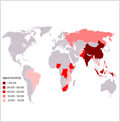 TB is a vaccine-preventable illness against which millions of children have been protected thanks to the BCG vaccine but the disease has made a steady come-back in recent years.
TB is a vaccine-preventable illness against which millions of children have been protected thanks to the BCG vaccine but the disease has made a steady come-back in recent years.
Around 80,000 cases of TB are recorded in the European region every year while and the proportion of cases which are resistant to conventional treatments is growing.
Read: TB: return of a preventable disease
The new TB strategy calls for greater collaboration across Europe to fight the disease, as well as more research to develop new vaccines and treatments for drug-resistant forms of the disease.
It also calls urges governments to invest in providing universal diagnosis and treatment of drug-resistant TB, adding that only one third of all cases are thought to be diagnosed at present.
The Roadmap to Prevent and Combat Drug-Resistant Tuberculosissets out a series of measures to be taken between now and 2015 which are essential to protecting public health.
The ultimate aim of the plan is:
- to decrease by 20 percentage points the proportion of drug-resistant TB among previously treated patients;
- to diagnose at least 85% of all estimated drug-resistant TB patients;
- to treat successfully at least 75% of all patients notified as having drug-resistant TB by the end of 2015.
Writing in the foreword of the report, Zsuzsanna Jakab says failure to deal with the rising threat of TB will lead Europe miss its Millennium Development Goals (MDG).
“The European Region has the highest rate of MDR-TB in the world, which speaks of the failure of health systems to treat the disease effectively,” she says.
The plan will cost an estimated $5.2 billion to implement, but Jakab says failure to meet its targets will ultimately cost an economic loss of approximately $12 billion within five years.
Read: Lethal TB ‘back with a vengeance’
The BCG vaccine, first used in 1921, is currently the only way to prevent TB, but the WHO says its effectiveness is limited and it cannot be administered to people living with HIV. The most effective medicines used against TB were discovered in the 1950s, the Organisation’s Action Plan states.
“There is an urgent need for more effective medicines and vaccines, including for children and people living with HIV. European scientific institutes can play an important role in research and development of new medicines and vaccines,” the WHO says.
The new ‘Roadmap’ says regional and international collaboration is needed for the “development of new diagnostic tools, medicines and vaccines against TB”.




